How zoos keep animals cool with ice lollies
- Published
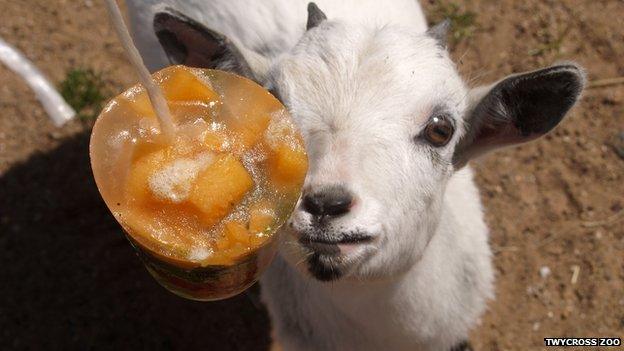
Twycross Zoo, in Leicestershire, feeds its animals specially-made ice lollies during hot weather
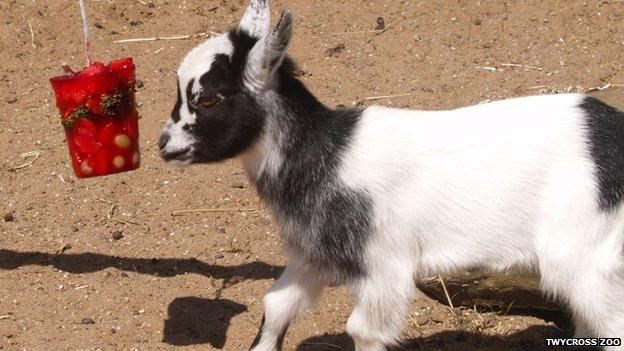
The zoo freezes fruit or vegetables in water or diluted sugar-free fruit juice
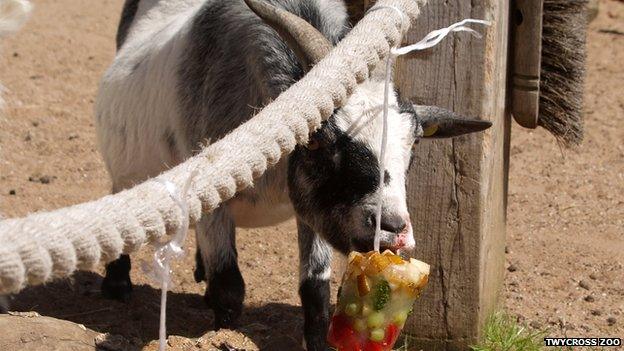
The zoo said it started giving animals ice lollies a few years ago
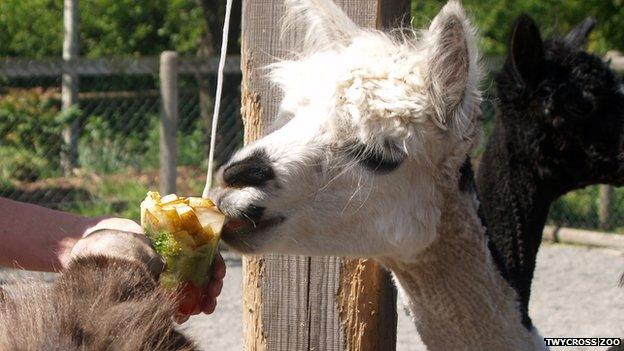
Twycross is one of a number of zoos and farms to have adopted the practice
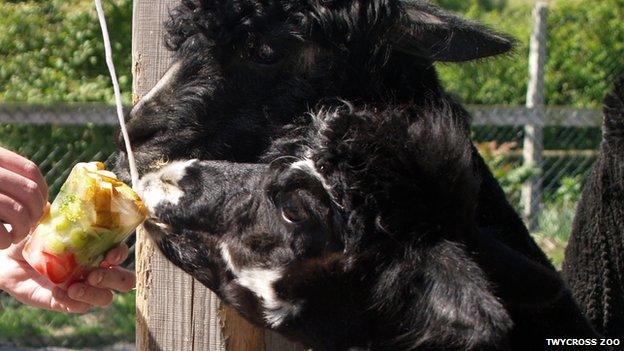
West Midlands Safari Park also provides ice blocks for its animals
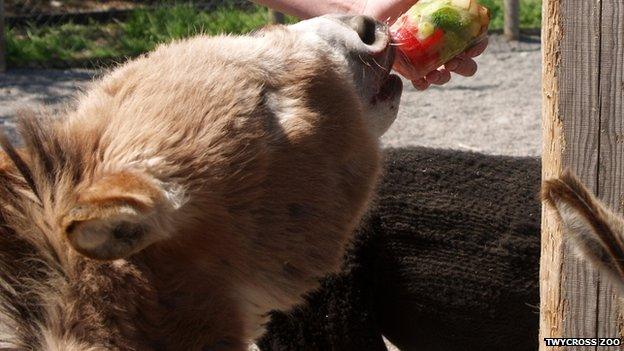
The park says ice blocks help take animals' minds off the heat
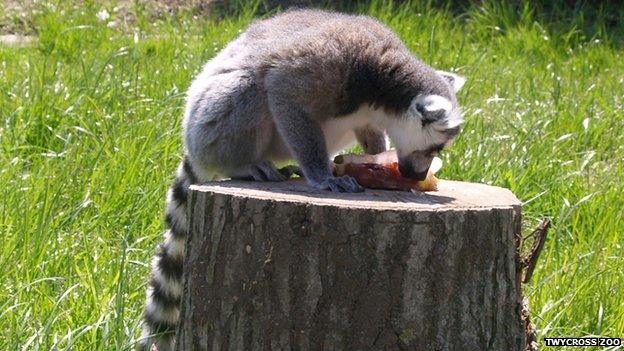
Other practices adopted by zoos, parks and farms include providing animals with plenty of shade and water

Many exotic animals adapt easily to hot temperatures but the RSPCA advises taking precautions
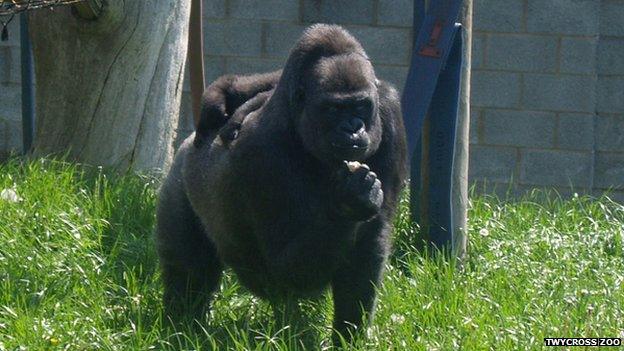
The charity says animals should be monitored during hot spells for signs of heat stroke
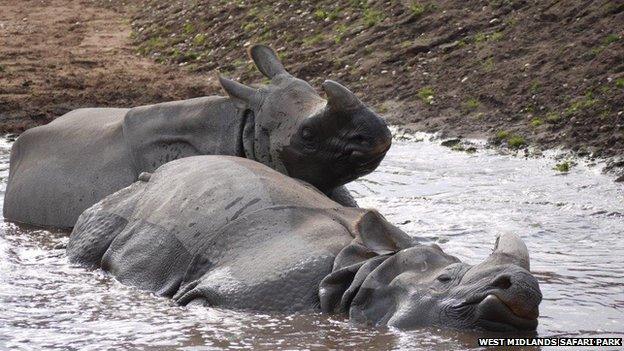
Wallowing in mud helps many animals condition their skin and also protects them from insect bites
As temperatures soar to 28C (82F), people seize on all kinds of ways to keep cool, from staying indoors with an electric fan to jumping into outdoor swimming pools.
But humans are not the only ones who have to worry about the effects of the heat.
According to the RSPCA, animals can also suffer during exceptionally sunny weather.
Chief inspector Dermot Murphy said: "Many animals can't sweat through their skin in the same way as humans and only cool down by panting and sweating through glands in their feet.
"This means that if precautions are not taken they can dehydrate, fall ill and even die."
So what are the best ways to keep our furry, feathered and scaly friends cool during dry spells?
BBC online asked zoos, safari parks and farms how they manage.
Zoos and safari parks
You may think that, of all animals, those from tropical climes would adapt most easily to soaring temperatures.
In many cases, that is true but Anna Westbury, a zoo-keeper at Twycross Zoo, in Leicestershire, says it is important to pay particular attention to animals during heat waves to protect them from dehydration.
"When it's hot we make sure our animals have plenty of fresh cold water and ensure they have access to large, shady areas to cool off in," she said.
Like many other zoos and farms, Twycross feeds its animals specially-made ice lollies during hot weather.
"We use whatever food is part of the animal's diet, such as fruit or vegetables, and freeze it in water or diluted sugar-free fruit juice overnight," said Ms Westbury.
"They're very easy to make. Meanwhile, our carnivores get to cool down with frozen blood blocks."
West Midlands Safari Park is another that employs the ice lolly tactic.
"We give our sea lions ice blocks with fish in them and our giraffes ice blocks with fruit and veg in them," said Bob Lawrence, director of wildlife.
"We also put ice blocks in the tigers' pool for them to play with. I'm not sure whether it keeps them cool but they seem to love it and it takes their mind off the heat."
Down on the farm
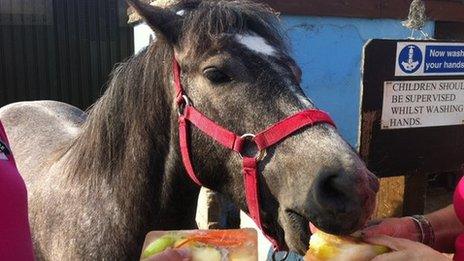
Horses at Stonebridge City Farm in Nottingham have also benefited from specially-made ice lollies
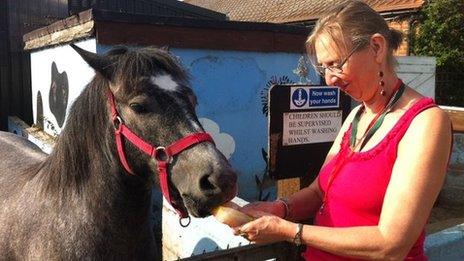
The farm also puts electric fans inside its barns to keep animals cool
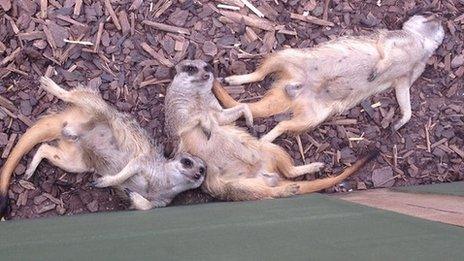
The meerkats at White Post Farm, in Nottinghamshire, enjoy cooling off on their backs
According to the RSPCA, unexpected warm weather can cause serious risks to farm animals.
The charity advises farmers to ensure buildings are adequately ventilated and to reduce the numbers of animals in each pen to allow air to circulate.
Stonebridge City Farm, in Nottingham, has electric fans inside its barns to keep its rabbits and guinea pigs cool.
"They seem to enjoy it," said education officer Stephen Gee. The farm also prepares ice lollies for its cows and horses.
Farms also have to help protect animals which are susceptible to heat stress, such as pigs and shorn sheep.
White Post Farm, in Nottinghamshire, gives its pigs regular sprays with hosepipes and keeps the area outside their pens muddy.
Anthony Moore, the farm's marketing manager, said: "There's a huge expanse where they can have a good wallow and cake themselves in mud to stop them from burning."
The farm also ensures there is plenty of shade for species such as meerkats, which sleep on their backs in the sun.
The RSPCA advises animals are transported as little as possible during periods of warm weather.
In the house
Animal lovers will be anxious to protect their pets during warm weather.
The RSPCA's Dermot Murphy said: "Simple things like moving small animals out of direct sunlight, topping up drinking water and waiting until the cooler part of the day to walk your dog or ride your horse can make a real difference to the welfare of your animals."
The biggest issue concerning pets and the heat is dogs being left in hot cars.
"No matter how often we stress this message, there will always be owners who think it won't happen to them, especially if they only leave their dogs for a few minutes," said Mr Murphy.
"But the temperature inside a vehicle can soar and it takes very little time for a dog to die in such heat. Dogs should never be left alone in a vehicle."
More exotic pets, such as caged birds, enjoy being misted with water during the heat, while if you have reptiles it's important to ensure thermostats are working in temperature-controlled tanks.
But the golden rule for animals - as with humans - is to keep them hydrated with a constant supply of clean drinking water.
"It's important they have shaded areas and plenty of clean drinking water available to them during hot weather," said Mr Murphy.
"That way they can replace any water that is lost through sweating and panting."
- Published27 June 2013
- Published29 January 2013